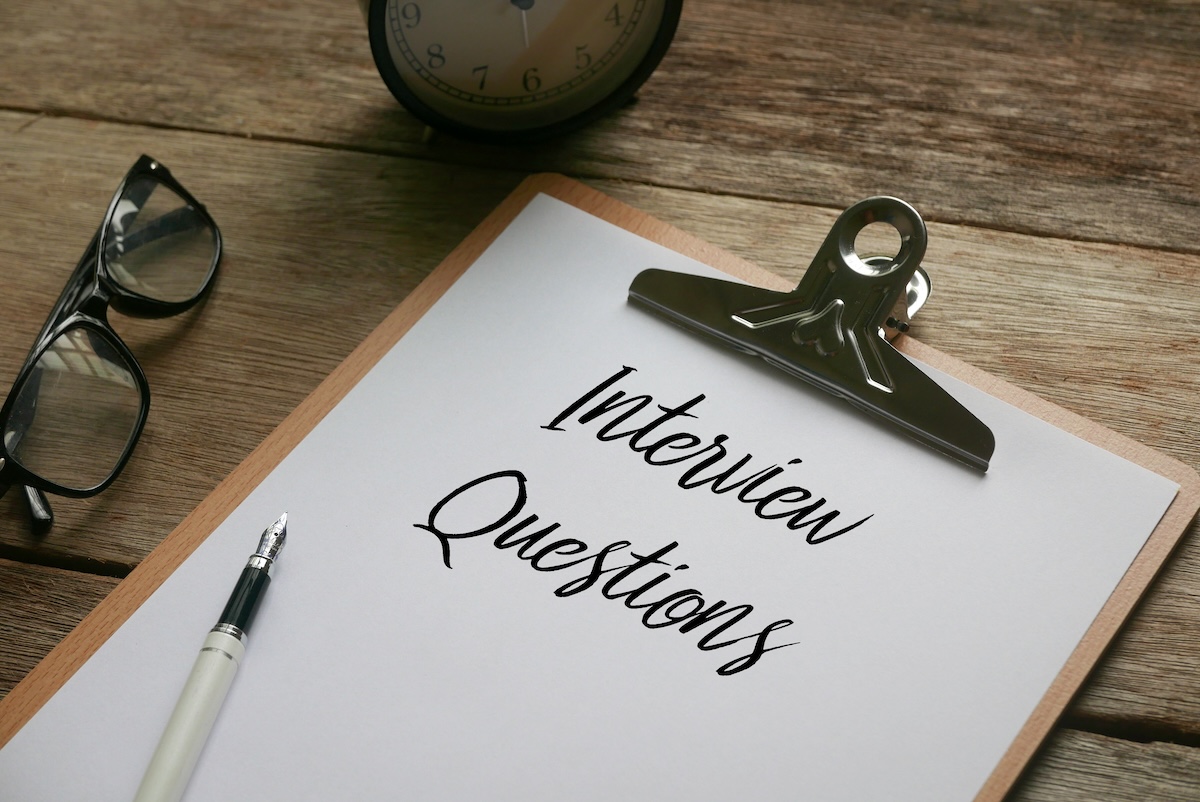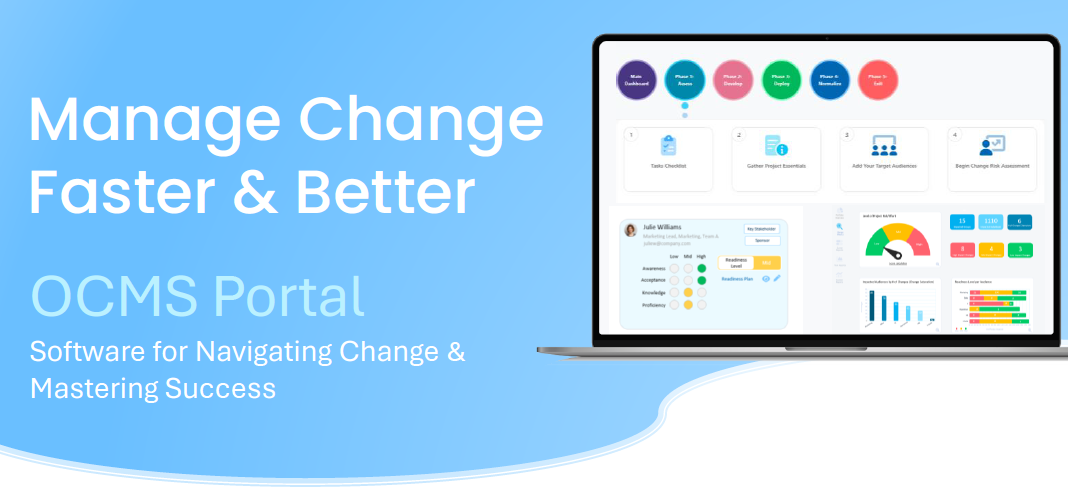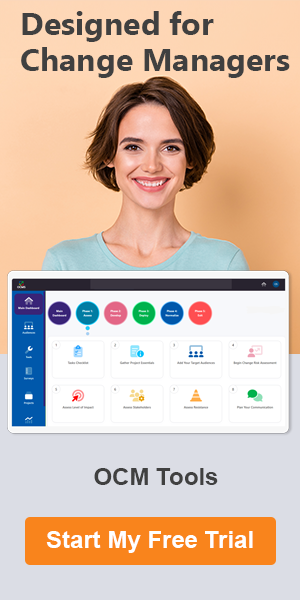How to Conquer Change Management Interviews
Land that dream change management job with confidence!
This Ultimate Guide to Change Management Interview Questions & Expert Answers equips you with everything you need to excel in your organizational change management interviews. We explore the diverse range of change interview questions on change management you might encounter, from theoretical concepts to real-world scenarios.
Our expert answers provide insightful strategies and practical tips to showcase your change knowledge and problem-solving skills. Get ready to impress your change management interviewer and kickstart your successful career in organizational change management!
Watch a summary below:
Story Highlights
|

The Multifaceted Challenge of Change Management Interviews
Navigating a change management interview presents several challenges due to the multidimensional nature of the discipline. From defining change management to detailing various change models, the breadth of interview questions on change management can be daunting. Interviewees may encounter change management questions ranging from theoretical concepts to practical scenarios, testing their understanding and ability to apply knowledge.
Tailored Responses for Mastering the Change Management Interview
To prepare effectively, candidates must delve into the specifics of the company and its practices, familiarize themselves with popular change models, and rehearse responses to a diverse array of interview questions. Researching the company’s background demonstrates initiative and enables candidates to tailor their answers accordingly. Understanding change models showcases adaptability and expertise in navigating change processes. Models such as:
- Prosci ADKAR
- Kurt Lewin
- and Kotter 8-Step Model
In addition to technical proficiency, candidates must exude a positive attitude and confidence during the interview. Non-verbal cues, such as posture and demeanor, play a crucial role in shaping the interviewer’s perception. Preparation extends beyond knowledge acquisition to encompass presentation skills, ensuring a well-rounded candidacy.
Equipped for Success: Behavioral Questions and Change Management Essentials
Behavioral interview questions, focused on past experiences and problem-solving abilities, offer insight into a candidate’s practical skills and interpersonal dynamics. By rehearsing responses to such questions, candidates can articulate their strengths and achievements effectively.
Preparation is key to success in a change management interview. Candidates must equip themselves with a thorough understanding of change management principles, company-specific information, and adept communication skills to navigate the interview process successfully.
Change Management Interview Questions and Answers from Change Managers. Everything You Need
Throughout my tenure as a Change Management Lead (Consultant), I often have to interview with clients for change management opportunities. I have also interviewed and hired lots of change practitioners to work on projects that I am supporting.
When I was at Apple, I established the firm’s first-ever business-to-business change management practice to support Apple’s enterprise sales organization. At Intel, I established and grew the firm’s first ever supply chain change management team.
The change manager interview questions, change management stakeholder interview questions, and general questions on change management that are outlined below are all designed to help you prepare for a change management interview.
And if you are a hiring manager who is interviewing change candidates, these questions will empower you to ask the right questions and quickly identify the top candidates from the long list of candidates.
Ogbe Airiodion
Sr. Change Management Lead
End-to-End Change Management (Strategic & Tactical)
Who is this Organizational Change Questions and Answers Guide Designed for?
This step-by-step guide on the most popular list of change management interview questions (as well as answers) has been published for change practitioners that are interviewing for a change manager job. It is also designed for directors and hiring managers that are seeking to hire a change resource and would like to know the best change manager interview questions to ask.
In addition, project managers and program leads can also find value in these change interview questions and answers.
If you’re interviewing for a job in change management, then you’ll want to study the potential change management questions and answers that may be asked. That way, you’ll be ready for anything that’s thrown at you. And if you are looking to hire a change resource, then this guide provides you with the best change management questions to ask to help you find a suitable candidate.
Don’t Miss: Free Change Management Templates

Get your free templates that include a change management questions and answers PDF associated with this change management guide
Table of Content
Below are the sections covered in this end-to-end change manager interview questions guide. You can scroll down and read each section, or you can click any of the links below to be taken directly to the section that is of interest to you.
- What’s In It For You?
- Challenges Involved with Answering Questions about Change Mgt
- List of Change Management Interview Questions and Answers
- Here’s How You Should Prepare for a Change Management Interview
- Change Management Competency Questions
- Detailed Interview Questions and Answers – Change Management
- General Organizational Change Management Interview Questions with Answers
- Behavioral Interview Questions Change Management Managers Ask
- Change Management Stakeholder Interview Questions
Contact us if you have any questions or feedback about this guide on organization change questions and answers. Also, let us know if you have additional change manager interview questions that you would like listed on this page to help other change management practitioners.
What’s In It For You? Interview Questions on Change Management
In this OCM Solution organizational change management article, we’re going to give you a complete list of the top organizational change management interview question with answers, including competency-based interview questions about change management.
We’ve taken them from a variety of areas of change management, including stakeholder management, impacts, adoption tracking, change readiness, coaching, training change management competency questions, and more.
Whether you’re asked to explain how teams manage change or given some change management scenarios to solve, these change management interview questions and answers should help you be well prepared for your next interview. And if you are a hiring manager and planning to interview candidates, then these questions will also help you to be better prepared.
Challenges Involved with Answering Questions about Change Management
Change management is one of those disciplines that includes multiple facets, which can make preparing for change management questions in an interview more challenging. During a change manager interview, you could be asked anything from “Describe change management” to “List three well-known change models.”
Delivering organizational change management programs involves everything from conducting change impact assessments, developing change plans, managing stakeholders, communications, resistance management, coaching, and more. This leaves a wide swath of potential change management interview questions that you could be asked.
You may also be given change management scenarios (use cases) and asked how you would handle them.
Change management scenarios are often tricky types of change management questions because they may not have a traditionally “right” or “wrong” answer. Still, it is often the type of behavioral interview questions change management hiring directors ask, and so you should be prepared.
Do you have any questions or feedback about leadership and change management questions and answers? We’d love to hear from you. Reach out here.
List of Change Management Interview Questions and Answers
- Make a case for why change management is needed – what are the benefits of change mgt? (Sample answers)
- What are key success factors for organizational change management? (Sample answers)
- Name 3 things that attracted you to our company? (Sample answers)
- How do you manage change interview questions (Sample answers)
- What are the various types of change? (Sample answers)
- What does a change manager do? (Sample answers)
- What are the key change management steps that change practitioners should complete? (Sample answers)
- What are some common change models that are used in change management? (Sample answers)
- Explain how teams manage change (Sample answers)
- How would you ensure that the key players from the project get timely information? (Sample answers)
- How do you initiate a change management project when there is no senior management support? (Sample answers)
- If you were added to the team, how would you align the executives in the first week? (Sample answers)
- What are some of the KPIs you use with a change project? (Sample answers)
- What type of information is included in a change project assessment? (Sample answers)
- What’s the point of an impact assessment? (Sample answers)
- What are some of the biggest challenges of a change project? (Sample answers)
- When do you consider the change project completed? (Sample answers)
- What are some of the common reasons that stakeholder employees and managers resist change? (Sample answers)
- What’s the best way to approach a stakeholder or user training plan? (Sample answers)
- What’s the purpose of a Change Champions Network? (Sample answers)
- Are managers or employees the most important stakeholders when guiding change? (Sample answers)
- Is it better to manage stakeholder resistance proactively or reactively? (Sample answers)
- What techniques do you use to motivate stakeholders and manage multiple stakeholders to support a change? (Sample answers)
- How can you tell if your communications about the change are effective? (Sample answers)
- How can you identify potential resistance to change? (Sample answers)
- What information do you track when you’re doing stakeholder analysis? (Sample answers)
Typical behavioral interview questions are listed below
- Tell me about a time you were in a difficult situation and you found a solution.
- Describe a situation where you’ve had a personality clash. How did you handle it?
- What can we expect from you in your first month on the job?
- Describe your leadership style.
- Tell me about a time when a mistake helped you learn something that made you better at your job.
- What did you like/dislike about your previous job?
- Describe how you’d deal with the conflict between two employees.
- What are your strengths and weaknesses?
- Why should we hire you over other candidates?
- Tell me about the most difficult change you’ve had to make in your professional career.
- Describe a success with moving a particularly resistant person towards supporting a change.
Other helpful topics, interview questions (change management), and answers can be found on the following pages:
- Organizational Change Management Tasks for Change Managers | (Step-by-Step)
- A Proven Change Approach to Managing Organizational Change
- Benefits of Organizational Change Management
- Change Management Success Factors
- Change Management Methodologies
- Change Management Processes
- Best Change Management Articles
- Change Management Strategic Playbook
- Change Curve
- Implementing an Organizational Wide Culture Change
- Change Management Steps & Tasks
- Top Change Management Approach
- OCM Phase 1 (Overview)
- OCM Phase 2 (Overview)
- OCM Phase 3 (Overview)

Would you like to receive content related to managing change interview questions? Sign up for our monthly newsletter filled with OCM tips and knowledge.
Here’s How You Should Prepare for a Change Management Interview
Preparing for a change management interview will include becoming familiar with the company you’re interviewing with and knowing in full the answer to, “What does a change manager do?”
You’ve also got to be prepared in regards to the experience you’ll need and your understanding of how to react in different change management scenarios. Hiring managers often ask change management case study interview questions, as well as team management interview questions.
Here are some steps for preparing for a change management interview.
Research the Company Giving the Interview
Some telling questions that some interviewers ask are, “Have you looked over our website?” or “Are you familiar with what we do?” Answering “no” to either of those questions can ruin your chances of getting the job because they show a lack of initiative. Sometimes interviewers will ask you to name 3 things that attracted you to their company.
Take time to look over the website and become familiar with the company that you’re interviewing with. Learn a few facts that you might be able to use with change management scenarios, such as, “I saw your company recently won a sustainability award. I approach change projects from a sustainable perspective.”
Become Familiar with Popular Change Models
Some companies always use a specific change model for their projects; others just use best practices of change management. To ensure you’re prepared for either scenario and the potential stakeholder management interview questions that may come your way, study change management methodology and change models.
It’s a good idea to be able to identify the basics of some of these popular models to show you’re flexible and have a good grasp of change management:
- The Prosci ADKAR® Model
- Kurt Lewin Change Model
- Kotter 8-Step Model
- Bridges Transition Model
- McKinsey 7S Model
Study Change Management Interview Questions with Answers
Part of your preparation is studying the different types of potential change management questions and answers that could be part of your interview. Being prepared will go a long way towards reducing your anxiety before the interview and helping you make a great impression.
In this article, we’ve included some of the following types of interview questions about change management with answers:
- Change management competency questions with answers
- Common organizational change management interview questions and answers
- Stakeholder management interview questions and answers
- Behavioral interview questions change management interviewers ask
Go in with a Positive Attitude
Being able to effectively answer the questions about change is great. However, your demeanor in the interview – how nervous you look, whether you slouch or sit up straight, how confident you are – are all just as important because they tell an interviewer a lot more about you beyond a change management questionnaire.
If you’re doing an interview over video, then take some time to prepare things like the lighting and background so you present a positive image. You’ll also want to be in a quiet place with no distracting background noise that could make it hard for the interviewer to hear you clearly.
You can get yourself prepared mentally by listening to empowering music or re-reading compliments you’ve received from others on your work before going in for your interview.
Being prepared for questions about change management helps make you a good candidate, but having confidence and a positive attitude can make all the difference to making you a great candidate, and helping you stand out from other candidates.
Business Change Management Competency Questions
We’re going to begin by going over three key change management competency questions that cover the often asked “how do you manage change interview questions”.
If you are a change director or hiring manager, change competency questions are important change management questions to ask. The change manager or practitioner’s responses to your “how do you manage change” interview question will show you how well the candidate being interviewed understands the main concepts of change management.
For change manager interviewees, we’ll explain each competency question in detail below so you’ll have a good body of knowledge to reference should you be asked any “how do you manage change” interview questions. These questions are:
- What are the types of change?
- What does a change manager do?
- What are the change management steps?
After we go through the detailed answers to the change management competency questions, we’ll get into the change management interview questions with answers, stakeholder management interview questions, and more.
Do you have any additional “how do you manage change” interview questions or answers that you would like us to include in this article, that can help other change management candidates? If so, contact us.
What Are the Types of Change? Competency-Based Leading Change Interview Questions and Answers
There are a few different types of changes that organizations can go through. There is no hard or fast rule for answering “types of change” questions which means this can be answered differently by different people.
However, when you describe change management and explain how teams manage change, it makes sense to differentiate a transformational change from a personnel change from an unexpected change. The type of change that’s happening may slightly alter how the change management steps are laid out. For example, an unexpected change is reactive, whereby a change designed to make a company better is proactive.
Here are 5 common types of change that organizations go through that can help you when responding to questions on change management types.
1. Transformational Change
Companies often look for ways to improve themselves and keep a competitive edge. A transformational change is designed to make a company better and more efficient in some way. An example would be if a company was adopting a new ERP system to streamline its business workflow.
Transformational change is typically planned well in advance and has undergone risk/benefit analysis in advance of the change project being approved.
2. Organization-Wide Incremental Change
An organization-wide change can also be one of the other types of change (i.e., unexpected or transformational). This type of change is when the change management steps are done incrementally because of the large scope of the project. For example, the change project may be spread out over the years to reduce disruption during a large organizational change.
3. Personnel or Culture Change
When the main change has to do with a staff or team, it’s known as a personnel change. This can be due to a merger or acquisition that is causing layoffs due to combining job duties. It can also be a change related to expansion and opening new divisions that need staffing.
Changes having to deal with personnel will require more attention to the stakeholder management areas of change management than usual in most cases.
4. Unplanned Change
An excellent example of an unplanned change that many companies around the world went through at the beginning of 2020 was the need to adapt to the stay-at-home orders due to the coronavirus pandemic.
This is a change that a company didn’t plan for and, in many cases, didn’t anticipate. It’s a time when the change team will be playing catch up to help everyone adjust to the new working environment.
5. Remedial Change
A remedial change is a change designed to fix a problem or address poor company performance. For example, if a company has a major data breach, a remedial change may be needed to improve its data security practices. A remedial change is usually planned, similar to a transformational change.
Keeping all these examples in mind will help you answer the “What are the various types of change?” interview questions on change management.
Do you have any additional leading change interview questions and answers that you would like to see listed in this guide to help other change practitioners? If so, reach out to us.
What Does a Change Manager Do? Competency-Based Leading Change Interview Questions and Answers
If you are an Interviewer, one of the most popular organizational change management interview questions to ask is, “What does a change manager do?”
This can be answered either in a short overview way in which the interviewing change manager or change resource describes change management in general. It can also be answered in more detail, listing some of the specific duties of a change manager.
If you are an Interviewee, the best way to prepare to answer, “What does a change manager do?” is to refer to the job description and see how they’re describing the position, then put it into your own words and add your own thoughts.
If you get change management questions related to what a change manager does, here is a short answer and an answer that is a little more detailed.
Short Overview Answer: What Does a Change Manager Do?
A change manager is in charge of leading organizational change, a big part of which includes using change management best practices to guide users through the change successfully to achieve the desired results.
 Change Management Questionnaire
Change Management Questionnaire
Longer, More Detailed Answer: What Does a Change Manager Do?
A change manager is in charge of leading organizational change. This encompasses things like creating a project roadmap, working with others to implement the change, and ensuring the change is reinforced and sustained.
This includes a variety of steps, such as using a change model or methodology as a framework to structure the change project, like the Prosci ADKAR or Lewin models. One of the biggest parts of managing change is managing the users going through the transition, addressing resistance to change, and overcoming any barriers.
Change managers work with a wide array of people at all organizational levels while implementing the change project, which includes coaching leaders on how to support the change and recruiting a Change Champions Network of employees in the organization to help drive the change.
Keeping track of change project metrics to keep the project on track and problem solving are both important parts of what a change manager does.
Would you like to receive content centered around answers to change management questions? If so, sign up for our monthly newsletter filled with OCM tips and knowledge.
What Change Management Steps Do Change Practitioners Need to Complete?
The change management steps taken to move a project from start to finish can be dictated by a particular change model that is being used.
The Prosci ADKAR model, which is one of the most popular, has 3 phases of change management. Those phases help describe change management in a systematic way and act as a framework for the steps to take.
This provides a great example to use if asked on a change management questionnaire or in an interview about the steps a change manager should take. It also provides helpful change management questions to ask, if you are interviewing a change management candidate.
Phase 1: Preparing for change
- Project assessment
- Stakeholder assessment
- Readiness assessment
- Impact assessment
- Structure the change management team
- Change project plan
Phase 2: Managing change
- Leadership coaching
- Communications plan
- Training plan
- Resistance management
- Celebrate milestones
Phase 3: Reinforcing change
- Measuring changes in behavior
- Corrective action plans
- Reinforcement mechanisms
- Individual and group recognition
- After-action review
Contact us if you have any questions or feedback about this guide on managing change interview questions. In addition, let us know if you have questions about change management in general.
Detailed Change Management Interview Questions and Answers
Now we’ll get into some of the most leading change management questions and answers that you’ll get during an interview for a change management position.
These won’t include stakeholder management interview questions, as we’ll go through those in the next section. If you are interested in how do you manage multiple stakeholders’ interview questions, you can click here to be taken directly to the change management stakeholder interview questions section.
Some of these organizational change management interview questions and answers come from interviewee input on Glassdoor. We’ve included these because they’re based on real change management questions asked by employers.
Note: We’re providing suggested answers to these questions on change management; however, these answers are designed to be a guide. You should put each answer into your own words based upon your change management knowledge and experience.
General Organizational Change Management Interview Questions with Answers
Question: What are some common change models that are used in change management?
Sample Answer:
One of the most popular change models is the Prosci ADKAR model, which describes 5 stages that stakeholders impacted by a change must be guided through for the change to become successful. (Awareness, Desire, Knowledge, Ability, Reinforcement)
The Lewin model looks at change as three states, unfreeze (unfreeze old behaviors), change, and freeze (reinforce new behaviors).
There is also the Kotter model, which emphasizes maintaining urgency and momentum throughout a change and the Bridges model, which is about the emotions users feel as they’re going through a change.
Question: Explain how teams manage change.
Sample Answer:
Change is managed through a series of steps, which includes doing assessments of change readiness and the impact a change will have on the stakeholders. During the planning stages, the various tasks are divided between the members of the change team.
The team also relies on leaders that they coach to help support the change in their divisions or departments and a Change Champions Network of employees that help support the change throughout the organization.
Change begins with individual behavior being changed, so guiding individuals and managing resistance is a big part of how teams manage change.
Question: How would you ensure that the key players from the project get timely information?
Sample Answer:
I would communicate to all parties with a summary of the pertinent information, either using email or a team communication platform (like Teams or Slack), creating a project-specific channel to keep all parties updated.
Using a communications plan helps ensure communications are put out regularly.
Question: How do you initiate a change management project when there is no senior management support?
Sample Answer:
If there is no senior management support, then a change project will most likely fail because the change will not be sustained by those leading the organization.
The best way to overcome this resistance is by doing a project assessment to provide details on why the change is needed, how it will benefit the organization, and how it will benefit each senior manager individually.
Winning over their support is critical to the success of the change project.
Question: If you were added to the team, how would you align the executives in the first week?
Sample Answer:
I would provide an introduction, review the parameters of the change project plan with executives, and focus on how my role will help the organization and each person working there.
Question: What are some of the KPIs you use with a change project?
Sample Answer:
Some of the change management KPIs and metrics used with a change project include:
Question: What type of information is included in a change project assessment?
Sample Answer:
Some of the things that are included in a change project assessment are:
Question: What’s the point of an impact assessment?
Sample Answer:
An impact assessment allows a change manager to gauge which stakeholders are being impacted by the change and the level of the impact. The stakeholders being impacted the most will need more attention and guidance through the change than those being impacted minimally.
The impact assessment helps guide where to focus resources during the change project implementation.
Question: What are some of the biggest challenges of a change project?
Sample Answer:
The change project can be challenged by stakeholder resistance to change, by setbacks based upon software or training, or budget problems.
The best way to handle setbacks is to be prepared and proactive about which problems may occur so you can meet them head-on and already have a plan to resolve them.
Question: When do you consider the change project completed?
Sample Answer:
It’s important to make sure a change is reinforced. An organizational change is never completed on the “go-live” date. After the change has officially been made / deployed, there should be a support and check-in process in place to support users, make sure they’re not having any problems, and ensure people aren’t falling back into the old ways of doing things.
After additional support has been implemented to reinforce the change and a post-project assessment has been completed to gauge the success of the project, then the change project can be closed out. Read more here: Change Reinforcement | Phase 3 | Everything You Need to Know.
Next, in the section below, we’ll cover key stakeholder management interview questions and answers.
Contact us if you have any questions or feedback about this guide on leading change interview questions and answers.
Stakeholder Management Interview Questions and Answers
Change management stakeholder interview questions will be about the “people” side of change in particular. They’ll be related to how you manage stakeholders and guide them through the change.
Some of these can be similar to behavioral interview questions change management interviewers ask, because they’re often connected to your leadership or management engagement style and how you handle interpersonal relationships.
For a detailed overview and understanding of answers to “how do you manage multiple stakeholders interview questions,” stakeholder management examples for your interview, and competency-based interview questions and answers on stakeholder management, click here: Best Stakeholder Engagement Guide for Change Managers.
The following are some common stakeholder management interview questions and examples.
Question: What are some of the common reasons that stakeholder employees and managers resist change?
Sample Answer:
Change resistance can come from a number of places, but it’s typically an emotional response to change. It can be caused by things such as:
- Fear someone won’t be able to handle the new process
- Anger that their job duties are being changed
- Past negative experiences with a change
- Confusion about why something has to change
Getting to the heart of the feelings behind the resistance is key to addressing the issue and moving someone past it to a supporting state.
Question: What’s the best way to approach a stakeholder or user training plan?
Sample Answer:
The best way to ensure a training plan is accomplishing its objective is to continually test users after each training session to gauge their proficiency. The goal is to see improvement in knowledge and proficiency after each session. If people aren’t progressing, it lets you know that you need to adjust the training plan.
Question: What’s the purpose of a Change Champions Network?
Sample Answer:
The Change Champions Network helps the change manager understand any resistance that users may be feeling, but not sharing with the change management team. The change champions also help support the change by answering questions from their co-workers and providing assistance where they can.
Change has been shown to fail if it was only driven from the top executives down. To give a change project its best chance at success, you need to have those at all levels in an organization promoting the change. This is where the change champions help greatly.
One of the biggest assets of the Change Champions Network is that it helps infuse an organization with excitement about a change.
Question: Are managers or employees the most important stakeholders when guiding change?
Sample Answer:
All stakeholders are important when it comes to a change project; however, managers and other supervisors can often influence the attitudes of their direct reports when it comes to a change.
That’s why it’s important to ensure leaders fully understand the benefits of the change project, “what’s in it for them,” as well as how to support the change among the teams they direct.
Question: Is it better to manage stakeholder resistance proactively or reactively?
Sample Answer:
Both proactive and reactive resistance management is important in change management. You want to be proactive to anticipate things that may cause resistance, such as asking stakeholders about their past experience with change and whether it was positive or negative.
However, it’s inevitable that unexpected resistance will arise during a project since resistance is a natural reaction to change. So, you need to also be prepared to reactively manage resistance.
Question: Explain how teams manage change by guiding stakeholders through the change.
Sample Answer:
There are a number of phases that stakeholders have to be guided through for a change project to be successful. The ADKAR model gives the best description of this, which is that users need to:
Question: What techniques do you use to motivate stakeholders and manage multiple stakeholders to support a change?
Sample Answer:
It’s important to have a strong vision statement that explains the change project in one or two sentences. This clarifies what the change is about and helps dispel ambiguity about the change.
One of the biggest motivators is also the WIIFM (what’s in it for me) factor. You need to explain to stakeholders not only how the change is going to benefit the organization as a whole, but also how it’s going to make their job easier or their working life better.
Question: How can you tell if your communications about the change are effective?
Sample Answer:
User engagement is an important gauge of how well your communications are hitting the mark. If you don’t receive much-requested feedback or participation in webinars or presentations is low, that’s an indicator you’re not properly communicating the benefits of the change and how each person plays a part in a successful change.
Its helpful to set up a metric or two by which you’ll gauge communications success, such as how many stakeholders took the desired action the communication directed, whether emails are being opened, or percentage of increase in awareness of the change.
Question: How can you identify potential resistance to change?
Sample Answer:
Not everyone is vocal about their resistance to change, so you have to look for certain signals that may indicate they’re resistant.
These include things like:
Question: What information do you track when you’re doing stakeholder analysis?
Sample Answer:
When doing stakeholder analysis, some of the information you track includes:
- Basics of their name, email, job title, supervisor, department
- How much impact they can have on the project (e.g., if they can slow it down)
- Whether they’re a manager, change champion, or another type of stakeholder
- Their state of acceptance or resistance to the change (which is tracked throughout the project)
- Whether or not they’ve had past experience with change and if it was good or bad
- Their training knowledge and proficiency during the project
For a detailed overview and understanding of answers to the “how do you manage multiple stakeholders” interview question click here: Best Stakeholder Engagement Guide for Change Managers.
Behavioral Interview Questions Change Management Hiring Directors Ask
Now, we’ll go over some of the behavioral “managing change” interview questions that hiring directors and managers often ask.
These don’t have specific set answers, because they’ll be personal to your experience or what you’d do in a particular situation.

Behavioral Change Management Interview Questions
These often include change management scenarios, where you’re asked to fill in the blanks on how you would handle things. Knowing these behavioral change management interview questions can help you be prepared if asked any of these.
Typical Behavioral Managing Change Interview Questions:
- Tell me about a time you were in a difficult situation and you found a solution.
- Describe a situation where you’ve had a personality clash. How did you handle it?
- What can we expect from you in your first month on the job?
- Describe your leadership style.
- Tell me about a time when a mistake helped you learn something that made you better at your job.
- What did you like/dislike about your previous job?
- Describe how you’d deal with the conflict between two employees.
- What are your strengths and weaknesses?
- Why should we hire you over other candidates?
- Tell me about the most difficult change you’ve had to make in your professional career.
- Describe a success with moving a particularly resistant person towards supporting a change.
Conclusion: Top Change Management Interview Questions and Answers
When interviewing for a position in change management, there is a wide array of potential change management questions and answers you could run across.
You’ll most likely get the standard behavioral interview questions change management HR people ask as well as change-specific questions, like “What does a change manager do?” or “Explain how teams manage change.”
Practicing answers to questions about change management scenarios can be helpful, so you won’t be caught blank when asked out of the blue how you’d handle a hypothetical situation.
Preparing ahead of time is important, so you’ll be ready for any type of change management questionnaire or live managing change interview questions you may encounter during an interview.
We hope that these change management interview questions and answers help you knock your interview out of the park! Don’t forget to let us know if you have additional managing change interview questions and answers that can be included in this comprehensive guide.
OCM Solution is a community of, by, and for change management and project management professionals. We’re here to help you succeed!
Change management interview questions include questions like: Tell me about a time you were in a difficult change management situation and you found a solution, describe a situation where you’ve had a personality clash during a change management program, and how did you handle it? What can we expect from you in your first month on the job as a change management practitioner? What are your change management strengths and weaknesses? ..... read more
Stakeholder management interview questions include questions like: Is it better to manage stakeholder resistance proactively or reactively? What techniques do you use to motivate stakeholders and manage multiple stakeholders to support a change? Read more ....What are change management interview questions and answers?
What are examples of stakeholder management interview questions?
Note: Content on OCM Solution's ocmsolution.com website is protected by copyright. Should you have any questions or comments regarding this OCM Solution page, please reach out to Ogbe Airiodion (Change Management Lead) or the OCM Solutions Team today. OCM Solution was previously known as Airiodion Global Services (AGS).
Images: stock.adobe.com





